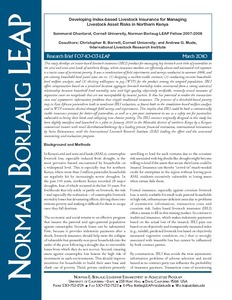Resource information
This study develops an index-based livestock insurance (IBLI) product for managing key livestock asset risks of pastoralists in the arid and semi-arid lands of northern Kenya, where insurance markets are effectively absent and uninsured risk exposure is a main cause of persistent poverty. It uses a combination of field experiments and surveys conducted in summer 2008, and pre-existing household-level panel data sets in: (1) designing a market-viable contract; (2) conducting ex-ante householdlevel welfare analysis; and (3) eliciting willingness to pay (WTP) for the product among the targeted population. IBLI offers compensation based on a predicted location aggregate livestock mortality index constructed from a strong statistical relationship between household herd mortality rates and high quality, objectively verifiable, remotely-sensed measures of vegetative cover on rangelands that are not manipulable by insured parties. It thus has potential to resolve the transaction costs and asymmetric information problems that cripple traditional insurance. The presence of a threshold-based poverty trap in East African pastoralism leads to nonlinear IBLI valuation, as found both in the simulation-based welfare analysis and in WTP estimates elicited through field surveys and experiments. This implies that IBLI could be both a commercially viable insurance product for better-off pastoralists, as well as a pro-poor instrument to use as a safety net for pastoralists vulnerable to losing their herds and collapsing into chronic poverty. The IBLI contract originally designed in this study has been slightly modified and launched in a pilot in January 2010 in the Marsabit district of northern Kenya by a Kenyan commercial insurer with retail distribution/brokerage by a leading private financial institution, international reinsurance by Swiss Reinsurance, with the International Livestock Research Institute (ILRI) leading the effort and the associated monitoring and evaluation program.



